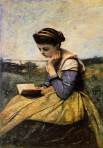Well folks, it happened. The library up and closed on you and here you are without anything to read. A great big library full of books, but you can’t get access to them. Does that sound fair?
Not to worry. Consider this a golden opportunity. After all, it has never been a better time to discover the wide and wonderful world of e-books. Do electronic books and audiobooks sound scary or weird? They’re not! These are just a new way to read all your favorites without leaving the comfort of your own home. And luckily for you, EPL has a whole range of options to choose from. Not just books either but also movies are sitting there just ripe for the watching. Here’s a quick How To guide on your options:
Overdrive / Libby
Okay, let’s start with the place that will have the LARGEST selection of ebooks just waiting for you. To make sure you get access to as many books as possible, Evanston Public Library belongs to an ebook consortium called the Digital Library of Illinois. Basically, a whole slew of local libraries came together to pool our ebooks. That means that even if we don’t have the specific title available that you’re looking for, at least there’s plenty of other things to browse. To access these books and audiobooks, all you need is your library card. Then you can either go to this website or download the Overdrive app which is named Libby. From there you’ll be asked to sign in with your library card. After that, all you need to do is find what you’re interested in and download it. Sometimes you’ll find that someone else has “checked out” the item you want. Don’t worry. You can just put it on hold and find something else to read or listen to in the interim.
Hoopla
Don’t feel like waiting around for someone to return an e-item? Then check out Hoopla, where there’s never a wait. Like Overdrive you can download the app or go to the aforementioned website to check out the selection. See something you like? You can check it out immediately! Just bear in mind that we have a daily limit and if too many people download items in a single day you might have to wait until the next day to get what you want. Best of all, there’s music, movies, and TV shows to choose from. All for the taking.
Kanopy
Of course, Hoopla’s movies and TV shows are a bit . . . limited sometimes. What if you wanted to see a classic film or something from the Criterion collection? What if you wanted to pluck something from a huge selection of indie films or documentaries? What if you wanted something from the Great Courses series? All of that, and much more, is available through Kanopy. And like Hoopla, everything you’ll find there is instantly available. Be careful, though. You’re only allowed three titles per month, so if you accidentally download something there’s nothing to be done!
Biblioboard
So here’s a question for you. What if you’ve an interest in reading the books written by your fellow Evanstonians? Is there a place where you can find ebooks by local writers? There is! Introducing Biblioboard. Like Knopy and Hoopla it’s based on simultaneous use. Browse works by locals or, if you’re feeling brave, check out the other self-published titles available. Are you interested in maybe getting your own book on the site as well. You can! With our Inkie.org program, you can format and submit your own title.
Enjoy the range of selections from your favorite local library. And don’t worry. Soon enough we’ll be up and running again, but now you’ll have the knowledge you need to keep checking out ebooks in the future. Cheers!





